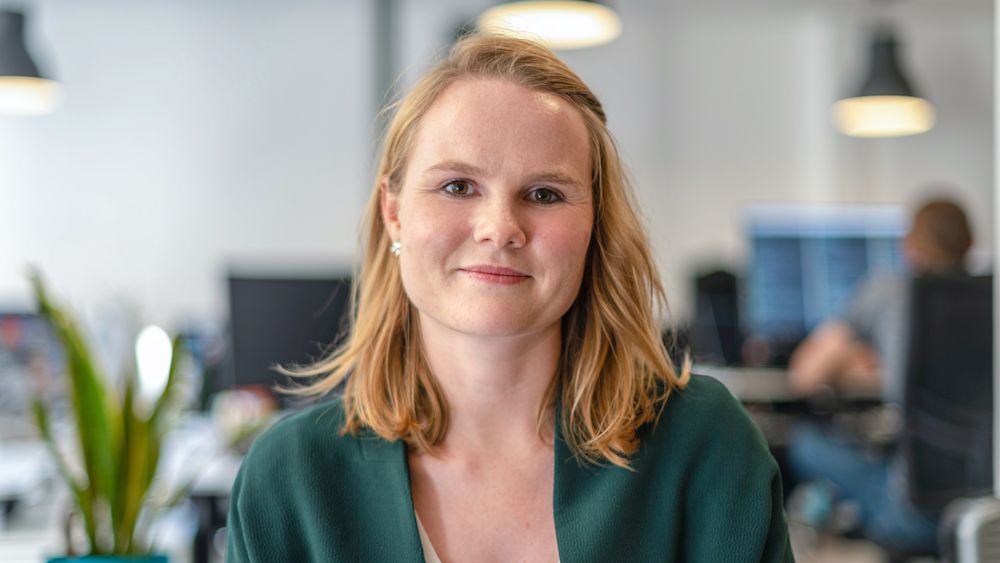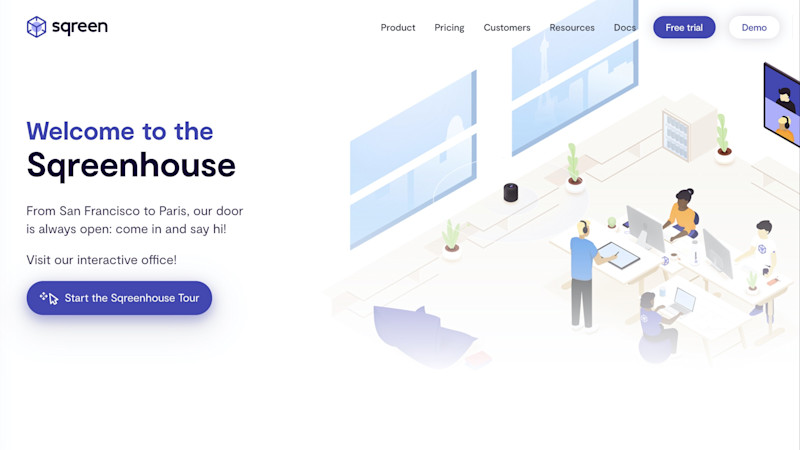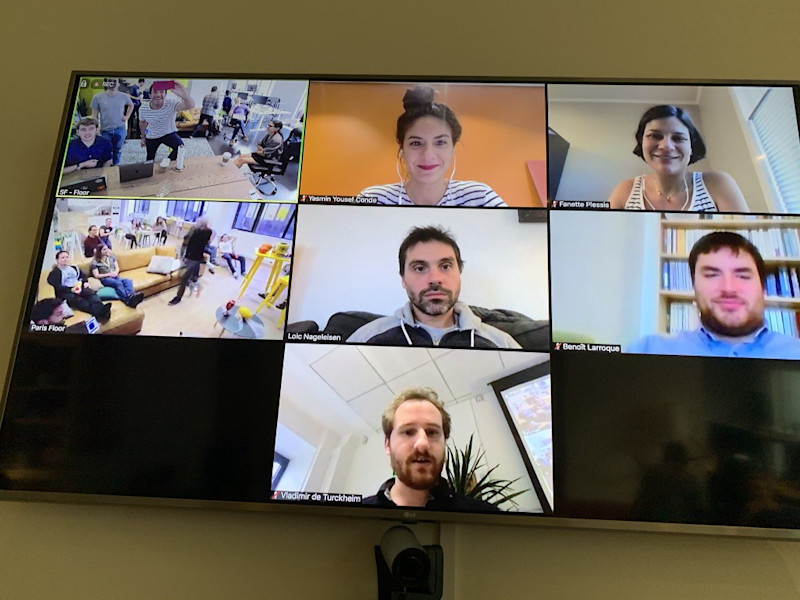- Iterate
- Meet The Team
- Questions, Novels, and Mental Frameworks: HR Tips from Sqreen's VP of People
Questions, Novels, and Mental Frameworks: HR Tips from Sqreen's VP of People
Table of contents
For as long as she can remember, Alison Eastaway has wanted to work in HR. Always one to be interested in the behind-the-scenes inner workings of things and not just the final shiny product, this career dream has been deeply rooted in Alison since childhood.

HR is Business as Usual
For Alison, "HR is just the way you solve certain business problems that are related to people, the same way a CTO solves business problems with technology." With that framework in mind, the ability to diagnose what's functioning and what's not functioning within a group of people, and then to identify what could make it work better, is the cornerstone of the role.
"All startups are different but also exactly the same. They all have the same problems at every stage: there is a set of problems that every Seed stage company has, that every Series A company has, and so on,” Alison said. “Then there's a couple of challenges that are either industry-specific or context-specific and also a few wildcards.”
While it's possible to benefit from the experience gained across different companies and HR roles, there is no cookie-cutter solution. More specifically, the contextual part is probably the hardest to grasp for both people handling HR and a founder hiring for that position for the first time.
"The answer I give the most often to an HR question is 'it depends,’ because the reality is that it's extremely contextual," explained Alison.
The collecting of information and clues is the only possible step to diagnose the situation and to propose solutions. To do so, HR managers should set themselves as people employees can trust, which implies not only being able to listen but also acting on issues raised by coworkers. Without proper actions, people won't trust their ability to solve the issues and therefore won't confide.
How did Alison come up with this framework? Humble, she redirects to a mix of things she was told or that she read, experiences she went through, ideas she spent time thinking about, but also the need to advocate about her role within the team. More specifically, reading has been influential in her personal growth as an HR manager - she has read at least one book a week since she was five years old.
"The role of fiction is to put you in the shoes of the main character and to make you understand what they want, what they care about, and to make you, the reader, care about the same thing,” Alison said. “I think it's a good exercise in empathy."
Her recommendations include The End of Average: How We Succeed in a World That Values Sameness by L. Todd Rose, which explains how education and workforce are misaligned and is the only HR book she'd recommend, anything by Patti Smith, and Expectation by Anna Hope, which gives a powerful representation of a strong female friendship.

Conveying a Message is Half the Battle
That empathy is crucial to one of the primordial aspects of HR: Do you want to be right or do you want to win? This is a lesson she always spends time educating managers about, as no matter the company’s culture and rules, egos are always involved when it comes to decision-making. Indeed, there are many ways to promote, fire, or review an employee, and “what you say and how you do it really matters," insisted Alison.
Currently living in Paris, Alison is originally from Sydney, Australia, which makes her more prone to notice how cultural bias can influence people’s management style. As she pointed out, as an "intellectual society," France culturally elevates the substance over the form, which can be an obstacle to successful communication with an employee or a teammate.
"Here, you can get this sort of 'well, you know all the facts were there, so who cares about the way the message is delivered?', but the way the message is delivered can sometimes overshadow what's being told,” Alison said. "And because we're quite emotional beings and because perception and ego are involved, the way you deliver a message is almost if not more important than the message itself."
Despite that, if you ask Alison which culture she identifies with the most, it's not Australia's. "I've spent most of my adult life in France, and sometimes I feel more European than Australian in terms of habits and mindset."
Mastering the Art of Deciphering
Alison joined Sqreen when the company had just raised a $14M Series A round from Y Combinator, Point Nine Capital, Greylock Partners, and Alven (the round was announced one year later). CEO Pierre Betouin was then trying to figure out how to carefully grow the team in a way that existing employees still felt part of the same company.
Startups growing their teams at a fast pace through aggressive hiring plans can often witness the dislocation of the team culture, a drop in older employees' motivation, and ultimately a skyrocketing turnover within the team.
Both Pierre and Alison were aware of these risks, which led them to have many discussions about how to properly design and execute their hiring strategy.
"After our Series A, I spent a ton of time with the 12 people who had been there for two or three years before me to get to know them and to understand why they joined, what they were excited about, what they would change if they were in charge, what they were worried about for the next stage, and to clarify which worries were individual issues and which were systemic," Alison said.
She then revamped the interview process and the company's external communication strategy to attract the best talents, which involved, among other things, writing blog posts about what it's like to work at Sqreen, and building Sqreenhouse, a digital and interactive guided tour of the office. Not everything worked out as planned though. Executive hiring was especially hard. "I don't have a good answer for it except that you will mess it up, and it will be painful," Alison confessed.

A Distributed Team Should be a Conscious Decision
This whole learning process didn't come without challenges for Alison. Sqreen rapidly moved to a distributed team organization: two months after she joined, a second office opened in San Francisco.
"We were deliberately distributed because we knew we needed to go where the talent was, and all the talents weren't going to be found in Paris,” Alison said. “That was a function of our product and our market, and we were fine with that."
To her admission, she learned a lot of hard lessons navigating the two offices: the difficulties of asynchronous and synchronous communication, the struggle of forging a company culture that translates well remotely, and the understanding of how each department functions, given that product engineering was happening in Europe while the sales and marketing teams were based in San Francisco.
Those lessons came in handy, though, when the COVID-19 pandemic hit the globe in early 2020. Since the team had already figured out most of the pieces to work efficiently across different time zones, the crisis didn't impact them as much - by January 2021, employees were scattered in more than 20 locations.
Now, if you ask Alison to pick the most important personal qualities to succeed in HR, she will answer, without hesitation, the ability to gain business acumen, a good understanding of how to ask questions, and some executive presence.

--
The Org is a professional community where transparent companies can show off their team to the world. Join your company here to add yourself to the org chart!
In this article


The ORG helps
you hire great
candidates
Free to use – try today